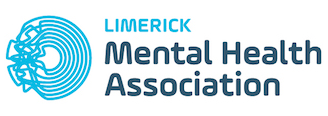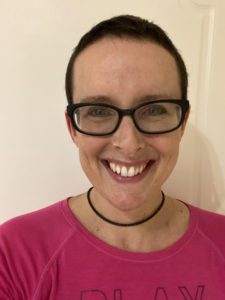 My name is Karen. I’m 44, a psychotherapist, a sociology lecturer, an occasional activist, and a parent. Last April five weeks into the first COVID lockdown, after finding a lump in my breast, a scan showed I had breast cancer and that it had spread.
My name is Karen. I’m 44, a psychotherapist, a sociology lecturer, an occasional activist, and a parent. Last April five weeks into the first COVID lockdown, after finding a lump in my breast, a scan showed I had breast cancer and that it had spread.
Over the years I have often spoken to clients and groups I work with about self care and wellness and facing a cancer diagnosis in the middle of global pandemic I have thought a lot about the things I so blithely told my clients they should do in times of crisis. ‘Exercise’, I told them, ‘eat well, sleep regularly, talk about your feelings, get out of the house, make plans, meet friends, join clubs, don’t catastrophise, get off social media’. And then 2020 came along. And the restrictions brought about by a pandemic have made this old advice seem hopelessly naïve and out of date. Reality IS catastrophic; everyone is as overwhelmed as we are; plans are impossible, meeting friends might cause them or us to die; social media is our only link to the world; and best medical advice is not to leave the house at all. There isn’t enough self care in the world to change these realities.
In an instant, all the strategies that we all used to cope with life became things of the past. Reality now is that we must live with a constant undercurrent of fear that exists like background noise to everything we do and every decision we make. ‘Self care’ and talk of ‘resilience building to cope with adversity’ implies that if we were somehow stronger that things wouldn’t feel so bad, that we should be untroubled by literal global catastrophe and the complete destruction of life as we have always known it. Shame on us for finding this global pandemic difficult, we must not be self-caring hard enough.
Overnight, pandemic coping seemed to become a competitive sport – and like all sport, I was no good at it. I made no bread, did no DIY, made no crafts, learned no languages, wrote zero books – I hardly even read a book. I was not enjoying all this ‘quality’ time with my children – I was failing at pandemicing.
And then I got a distraction.
After the initial scan found there was cancer and a biopsy was taken, and numerous other scans were done to see exactly how much trouble I was in, there were two weeks where I had to wait for the results. Those two weeks are where you have Schrödinger’s cancer – you could be facing anything on a spectrum from a terminal diagnosis to a quick fix and there is nothing to do but wait and see.
As a society, we are living through Schrödinger’s pandemic, and there is nothing for any of us to do, but wait and see.
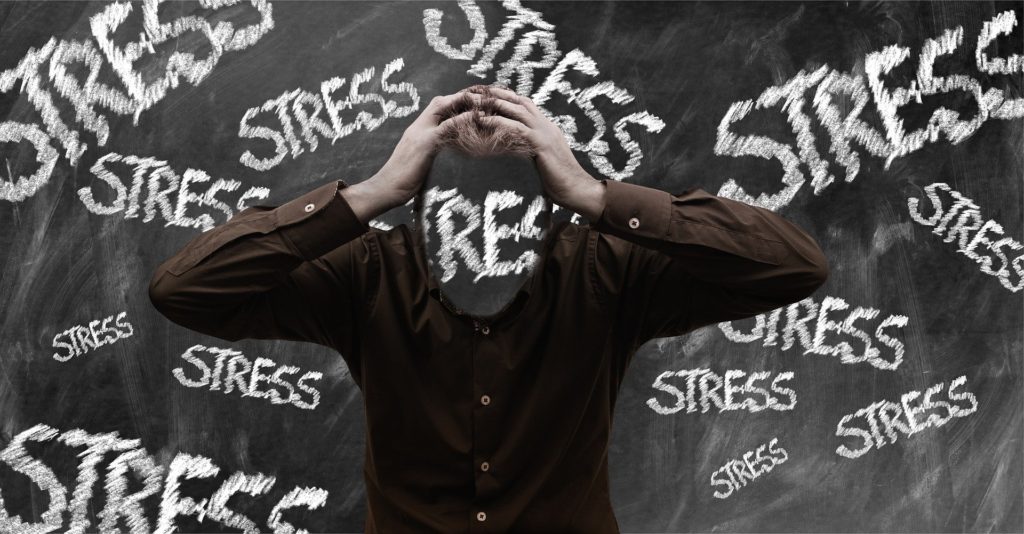 Waiting is hard. Possibly the hardest thing there is. We are a culture of doers. We’ve been trained by global capitalism that busyness is good, we’ve been using busyness to distract ourselves from worries for generations. And now we’ve been told to stop doing, and just be. And that leaves us nothing to do except be terrified and overwhelmed.
Waiting is hard. Possibly the hardest thing there is. We are a culture of doers. We’ve been trained by global capitalism that busyness is good, we’ve been using busyness to distract ourselves from worries for generations. And now we’ve been told to stop doing, and just be. And that leaves us nothing to do except be terrified and overwhelmed.
During my waiting, and ‘be-ing’, people in my life were wonderful but only one thing helped. My sister messaged me one day to ask how I felt, and in a moment of weakness I let my guard down and replied ‘terrified’. I regretted it instantly and went to delete it – but she’d seen it. I could see that she was typing her response for a long time, stopping and starting and I braced myself for some version of ‘you’ll be grand’. The reply, when it came, simply said, ‘me too’.
And just like that, I wasn’t alone; I was part of a team. Although reality hadn’t changed, having someone to be terrified with lifted the terror and made it manageable. The weight on my chest lightened instantly.
Literature on trauma, the entire field of psychotherapy, and a thousand years of poetry and philosophy, talk about the healing power of connection and emotional intimacy. However, connection and intimacy require us to be vulnerable and in a global pandemic where all the pillars of our lives as they were before seem to be crumbling around us, allowing ourselves to be vulnerable is a very big ask and can feel like too much of a risk to take when we all feel like we are just clinging on.
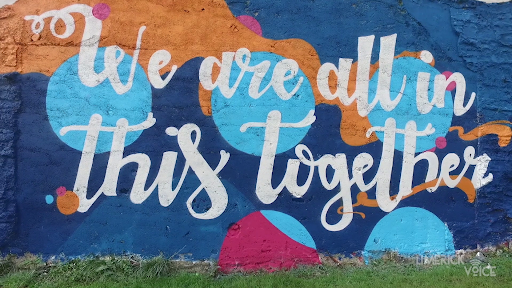
As a species we are in what the literature calls a ‘liminal space’, we are waiting and facing the unknown. We understand that things will not be as they were, but we don’t know what they will be like; we have very little power and no certainties. Humans like certainty and we like meaning. We tell ourselves a story about what is happening so that we can understand it. I’ve always been fascinated by stories. In psychotherapy we use them as therapy, in politics, as messaging, but at the heart, it’s all just the stories we tell.
And there’s enormous power in stories. There is no truth, only the story we tell ourselves, and the story we tell ourselves about 2020 is extremely important. Do we tell ourselves that the world is full of beauty and kindness? Or that it is dark and unfair? Both stories are true.
Do we tell ourselves that ‘other’ people behaved incredibly foolishly over Christmas and put us all at risk? Or do we tell ourselves that we are social beings who yearn for company and connection. That love and loneliness makes people do foolish things and that we are all exhausted from fear fatigue and emotional burnout from the constant gnawing terror and uncertainty of the last year – that we are punch drunk from crisis after crisis, and that powerlessness makes us feel angry and alone.
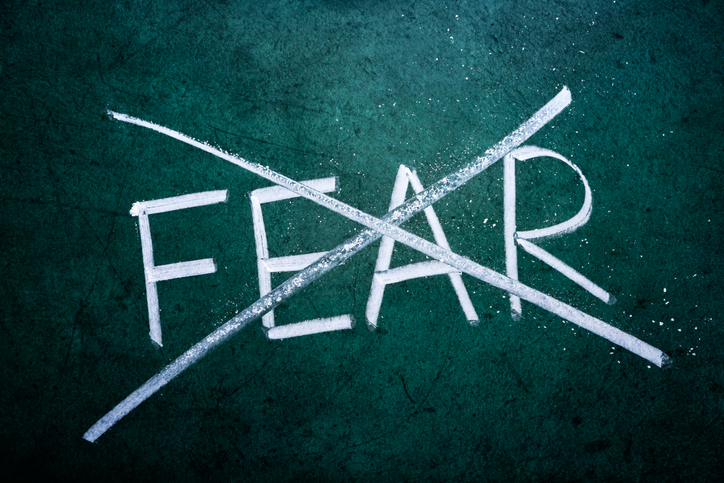
For my money, I think we are exhausted from fear. Feeling it, hiding from it, distracting ourselves from it, fighting it. Not a day goes by that most of us don’t spend some part of feeling lonely and terrified. We are creatures who yearn for connection and touch and we’ve been forced to stay distant from those who could give us comfort in our fear.
Our frontline health workers are heroes. Our teachers are heroes. But there’s another type of heroism that needs to get some attention. It is the people who are quietly holding everything together for their people – and this is most of us. We are overwhelmed and afraid, but we’re also working, caring, supporting, encouraging, homeschooling, grieving, and continuing. We are keeping the flame of hope and possibility alive for ourselves and the people in our lives during a time of extreme uncertainty. We are showing up.
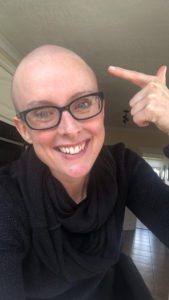 The story of my COVID cancer diagnosis is one of luck and love. I found it early, there were no delays in my treatment, the chemo worked quickly, the surgery was a success, and I was surrounded by people who supported and love me. Not a day goes by when I don’t think about all the people whose story of 2020 is very different. People who perhaps had no-one to say ‘me too’ to them when they were scared.
The story of my COVID cancer diagnosis is one of luck and love. I found it early, there were no delays in my treatment, the chemo worked quickly, the surgery was a success, and I was surrounded by people who supported and love me. Not a day goes by when I don’t think about all the people whose story of 2020 is very different. People who perhaps had no-one to say ‘me too’ to them when they were scared.
So how do we survive lockdown 3? Well, I have no idea. But it gives me great comfort to know that no-one knows. There is no-one anywhere who knows how to do this. We are all learning together what works and what doesn’t. We are all figuring out what is meaningful and important and needs to come with us, and what, perhaps, needs to be left behind.
For me, 2020 has forced me to lower my expectations of myself. If my children aren’t on fire at the end of each day, I count that as a success. I hope that I am modelling for them what it looks like to simply keep showing up when things are hard. When I was at my most terrified, all I needed was company in my terror, and I think perhaps that is all any of us need – just to know that others feel as we do.
If you feel terrified, overwhelmed, exhausted and unsure whether you’ll be able to deal with whatever comes next – please know this – me too. But the great gift of 2020 is knowing that there are a great many of us who feel this way, and the thought that we can figure it out together gives me hope.
Written by Karen Sugrue who has been with the Social Care team in Limerick IT for the last 18 years where she works as a sociologist and psychotherapist and teaches the best students in Ireland. She is passionate about inclusive, intersectional feminism and supporting women in politics. She lives close to the college with her kids, her cats, and constant reruns of Star Trek and the West Wing. All views expressed are entirely her own.
